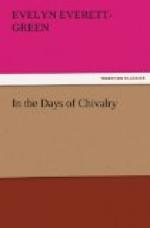“Sooner would we die than that one hair of their head should be touched!” cried both the boys impetuously; “and Margot lives in fear and trembling ever since we told her of the words we spoke to yon tyrant and usurper of Saut. We told her for her comfort that he would think us too poor and humble and feeble to vent his rage on us; but she shook her head at that, and feared no creature hearing the name of De Brocas would be too humble to be a mark for his spite. And then we told her that we would sally forth to see the world, as we had ever longed to do and though she wept to think that we must go, she did not bid us stay. She said, as thou hast done, good Father, that she had known that such day would surely come; and though it has come something early and something suddenly, she holds that we shall be safer facing the perils of the unknown world, than living here a mark for the spite and malice of the foe of our house. If no man holds us back, why go we not forth tomorrow?”
The priest’s face was grave and even sorrowful, but he made no objection even to so rapid a move.
“My sons, if this thing is to be, it is small use to tarry and linger. I would not that the Sieur de Navailles should know that you have hidden your heads here so long; and a secret, however faithfully kept, that belongs to many, may not be a secret always. It is right that you should go, and with the inclement winter season hard upon us, with its dangers from heavy snows, tempests at sea, and those raids from wolves that make the peril of travellers when the cold once sets in, it behoves you, if go ye must, to go right speedily. And in the belief that I should find your minds made up and your preparations well-nigh complete, I have brought to you the casket given into my charge by your mother on her dying bed. Methinks that you will find therein gold enough to carry you safe to England, and such papers as shall suffice to prove to your proud kinsmen at the King’s Court that ye are in very truth the sons of their brother, and that it is of just and lawful right that you make your claim to Basildene.”
The brothers looked eagerly at the handsome case, wrought and inlaid with gold, in which certain precious parchments had lain ever since they had been carried in haste from England. The boys looked at these with a species of awe, for they had but very scant knowledge of letters, and such as they had acquired from the good Father was not enough to enable them to master the contents of the papers. Learning was almost entirely confined to the ecclesiastics in those days, and many were the men of birth and rank who could scarce read or write their own name.




